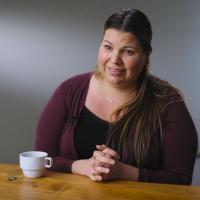Neurosurgeon on Thriving Despite Tragedy
THAT MASSIVE THING (TMT)
Dr. Lee Warren is an expert in trauma. As a brain surgeon with twenty years of experience and a former combat surgeon, he’s cared for and walked with hundreds of patients in their darkest times. He also knows that trauma comes in many forms. “Whatever it is, it’s your massive thing: someone left, someone cheated, the biopsy was bad, the baby didn’t have a heartbeat, somebody died, you’ve suffered abuse, a global pandemic destroyed your business … there’s something,” he says.
His own darkest hour arrived on Tuesday, August 20, 2013. The night before, he and his 19-year-old son, Mitch, had had a great conversation. Mitch told his dad he planned to return to college, that his faith was getting stronger, and that he loved him. The next night, he received a call that Mitch and his best friend were dead. Both young men had been stabbed; Mitch eight times, and the friend, once. The Prattville police called the deaths a murder-suicide, and determined that Mitch had killed his friend.
His family doesn’t believe it. “Mitch had a cast on his arm, and all the knives had blood on them, yet the police didn’t even check for fingerprints or call for detectives to investigate,” Dr. Lee says. “He loved this other boy. And he hated violence so the idea of him killing someone and then himself is impossible for me to even contemplate.” He says no proof of what truly happened that night has surfaced in the ten years since the tragedy.
GRIEF AS AN IDOL
“Losing a son made me infinitely sad, hopeless, tormented, lost, and faithless for a while,” Dr. Lee admits. “Your massive thing will likely do the same to you.” Some weeks after Mitch’s death, a good friend gave him some advice that he couldn’t appreciate at the time, but in time, made a lot of sense. Since writing his book, Dr. Lee has found that his friend’s words have deeply resonated with others. The friend, Jon, also a hospital chaplain, made him aware of a pitfall that can trap those deeply grieving. Having suffered the death of two of his children, Jon was well-acquainted with despair. The two were talking one night after Dr. Lee had operated on a young boy and saved his life. Jon noticed that he didn’t stay to pray with the family, as usual, and said to Dr. Lee, “This is the point where it’s so easy to make an idol out of your pain.”
Confused, Dr. Lee asked him to explain. “A lot of people do that with grief and pain. They fix their eyes and their hearts on a casket or a divorce or a diagnosis, they drink or use drugs or do something else to numb the pain, and they spend their lives holding on to the hurt so tightly that it becomes the only thing they have. That’s basically idolatry. It’s making a god out of your circumstances instead of letting God help you process them. That’s a dangerous place to live, Lee.”
In his many years of working with patients who had lost loved ones, Lee observed some who never overcame their grief. In time, he was able to choose not to be one of them.
TRAUMA’S AFFECT ON THE BRAIN
As a neurosurgeon, Dr. Lee can explain in detail how trauma affects the brain in order to deal with and heal from it. “Our brains on TMT go through a process of progressive disease and dysfunction that keeps us down … until we learn to handle our traumas and tragedies in a healthier way.” A few of those ways:
• “We have intrusive thoughts about our TMTs that lead to mutated, unhealthy emotional responses.”
• “Left unchecked, this emotional cancer then spreads into a network of bad thinking that interacts with trauma’s lying voice (wrong conclusions, false stories, etc.) These repetitive thoughts and behaviors can become programmed over time, just like the sick synapses that cause seizures to spread in epilepsy patients.”
• “Our diseased synapses then allow this negative atmosphere to create lousy attitudes, which now have some agency in our choices. Then we’re reacting to our own attitudes instead of the real situations we’re in.”
HOPE AMIDST TRAUMA
Dr. Lee has come to the realization that it’s not the painful trials of our lives that determine our future, but how we choose to think about them. He says these truths are vital to our thinking about trauma:
• “We cannot wait to be pain-free before we decide to fight for life again, because life is never pain-free, and some things never stop hurting.
• “We must believe that the pain of moving forward will produce improvement and healing, while the slow failure of staying put will lead only to more…”
• “We need the context of community to help us see that others have managed to hold on or rediscover hope and faith…”
• “We have to change our minds about what “okay” and “normal” mean going forward.”
• “We must … be able to see how badly others in our lives still need and want us to stay in the fight.”
• “We must unlearn some things we believed we had to have to be happy …”
• “We must learn new skills to give our pain meaning and purpose despite our loss…”
“It’s time to understand your thoughts about your TMT – the labels you’ve accepted, your regrets, shame, self-blame, fears, doubts, and grief.” One way Dr. Lee says we can do that is to perform what he calls the “bad-thought biopsy,” a method to examine and redirect a thought, for which he offers this example:
THOUGHT: “I did something wrong, or he would have been home with me that night.”
BIOPSY: Is the thought true or false?
RESULT: It is objectively false.
TREATMENT REQUIRED: Thought transplant.“You didn’t have any opportunity or possibility of changing where Mitch was that evening. He lived in another city and was an adult. You can’t change it, and it doesn’t help you now to ruminate on it.”
“We must relentlessly refuse to participate in our own demise,” Dr. Lee exhorts. To help us stand on that conviction, Dr. Lee highly recommends looking to the example of others and how they’ve overcome traumatic experiences. In his own life, he saw how God carried his brother through the loss of a son. And he saw the wonderful example of his in-laws, Dennis and Patty, who had lost two children. “Patty had told me, ‘We knew we’d go insane or completely lose ourselves if we didn’t find a context to put our pain into, some meaning or purpose for it. So, Dennis became a chaplain to minster to other hurting people, and I started teaching the little ones about Jesus, and I found out who Jesus was by trying to show him to others. I learned more than I taught. And over time, we figured out that we hadn’t died. We came alive again by deciding to live.’”
Dr. Lee says that he has joy again and that the family is experiencing the abundant life that God promises in John 10:10. “I am not defined by, but refined by” what I went through with Mitch and how it changed our lives forever.
Dr. Lee Warren's book, Hope is the First Dose, can be purchased by going to: www.wleewarrenmd.com.




